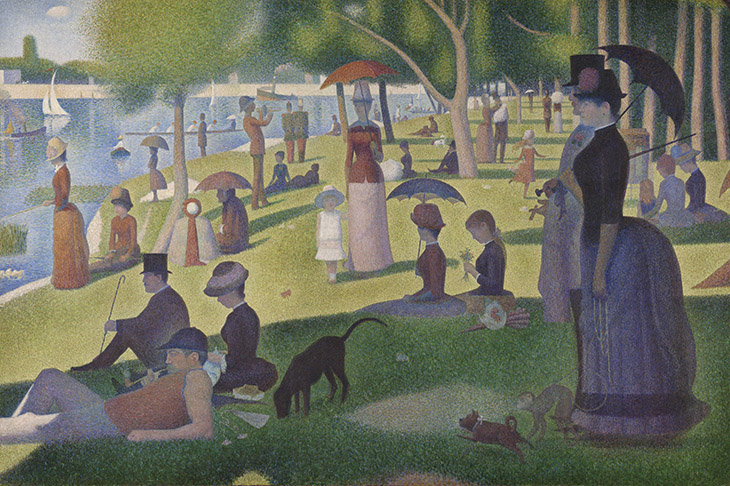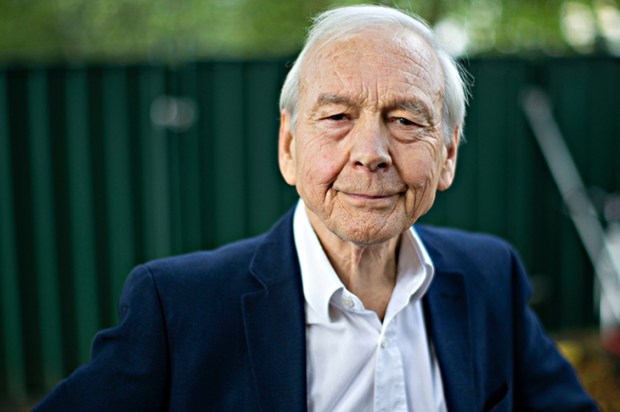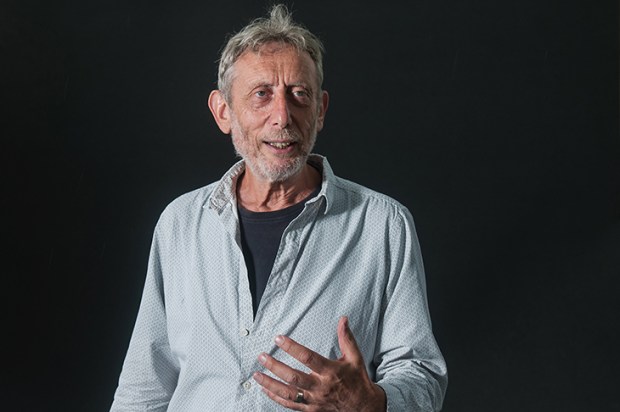‘It’s too familiar, too obvious,’ says Cathy FitzGerald at the beginning of her new interactive series for Radio 4, Moving Pictures. But then she took another look at Georges Seurat’s ‘A Sunday on La Grande Jatte’, that huge, weird and unsettling pointilliste painting of a crowd of Parisians enjoying a sunny afternoon on the banks of the Seine some time in the 1880s. Instead of the 30-second glance we might give it in the art gallery, or five minutes at the very most, FitzGerald encourages us to linger, to look a little more slowly, take in the detail and fully appreciate what’s there on the canvas. After all, Seurat took two years to finish it.
If you’ve not come across FitzGerald’s programmes before on works of art that we might think we know but not really, she’s teamed up with Google Art so that as you listen to her discussing her chosen picture with a group of art historians and curators, you can also zoom into a high-resolution on-screen image, getting far closer to the canvas, the brushstrokes, the artist’s intention than you would ever be able to in the gallery (the Seurat in any case is in Chicago). It’s truly eye-opening, taking us inside the painter’s imagination and then back out to what’s on the canvas and ensuring that we miss nothing.
Who, for instance, is the figure with her back turned towards us (at least we assume she must be a woman), wearing a strange cloak-like garment and a cream hat with a long burnt-orange tassel? Why is the figure next to her, whom we see in half-profile, sitting there with his shoulders hunched up, his arms folded, as if he were cold in spite of the blazing light that bathes the picture? FitzGerald and her guests help us to see right into the scene. Why is that woman standing there with a monkey on a lead? Is the man who’s playing a horn in the middle of the crowd oblivious to the fact that he’s disturbing everyone’s afternoon? Does the boatman sprawling on the grass in a singlet and cap know the neat lady in black who’s sitting primly next to him with her sewing on her lap?
None of it makes sense, and yet somehow Seurat brings them all together, as if such an afternoon did once take place in Paris, a moment in time captured and held there for us to look at many years later. The painting was first seen, FitzGerald explains, at the eighth impressionist exhibition in Paris in 1886. Five years later, Seurat was dead, aged just 31. What might he have achieved next, FitzGerald wonders, in a programme that uses new technologies to develop the audio experience. How else could we have known that the tall lady just off-centre has a thin blue veil over her face, or that there are two puffs of smoke wafting across the canvas from the cigar in the hand of the man beside her?
Alan Dein also makes the most of internet technology to develop his skill at recording life as it is lived, capturing those everyday thoughts and then editing them to draw out deeper meanings. Don’t Log Off, consists of a series of online conversations with ‘friends’ from around the world he meets on Facebook. It’s back on Radio 4 (produced by Laurence Grissell). He dials up Natasha, who’s studying in Beijing but when Dein rings she’s back at home in Russia celebrating her birthday with her family in temperatures below 30°C. She’s 19, speaks amazingly good English, and taught herself Chinese from the internet while she was still at school because she was bored and didn’t want to study Russian literature. ‘No, I don’t see myself as Russian,’ she tells Dein. ‘I’m way too international.’
Roland, though, who’s now living in Mexico aged 86, wishes he had never left Germany. He was born there in 1932 and remembers as a boy when the neighbourhood synagogue was burnt down. His parents did nothing. When Roland as a teenager asked his father why not he replied:‘I had a family.’ Roland now says, ‘A man’s strength is to adapt. And that is also his weakness.’ He left Germany after the war, sailing for Canada on a no-return visa, and settled in America where he married and lived for more than 40 years. But he thinks now he would have had a better life if he had stayed.
Dein next makes a random call to Mariam in Kabul, who’s 22. She grew up under the Taliban, who ensured she got no education while her family lived in constant fear of being forced to leave their home. ‘How much it destroys your heart,’ she tells Dein. But when he asks her whether she has ever thought of leaving Afghanistan, she tells him, ‘Honestly, I think our home is our home… I love different cultures but I really love to live in this country. To die here.’
Are you optimistic that peace will ever come to Afghanistan?
‘Everyone is hopeful,’ she says. ‘I think there is a good chance of peace because the families are very tired, their children are very tired of this war.’
Got something to add? Join the discussion and comment below.
Get 10 issues for just $10
Subscribe to The Spectator Australia today for the next 10 magazine issues, plus full online access, for just $10.
You might disagree with half of it, but you’ll enjoy reading all of it. Try your first month for free, then just $2 a week for the remainder of your first year.














Comments
Don't miss out
Join the conversation with other Spectator Australia readers. Subscribe to leave a comment.
SUBSCRIBEAlready a subscriber? Log in